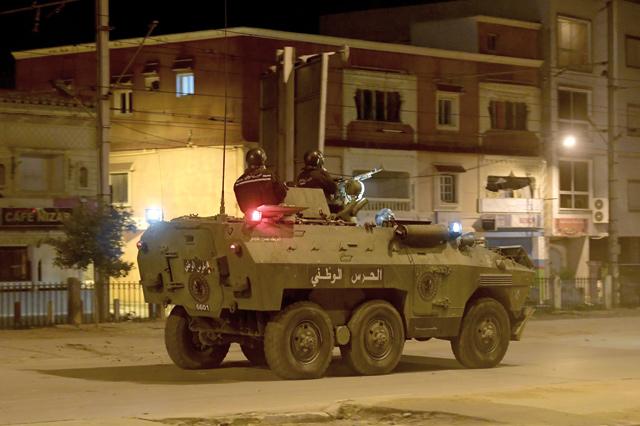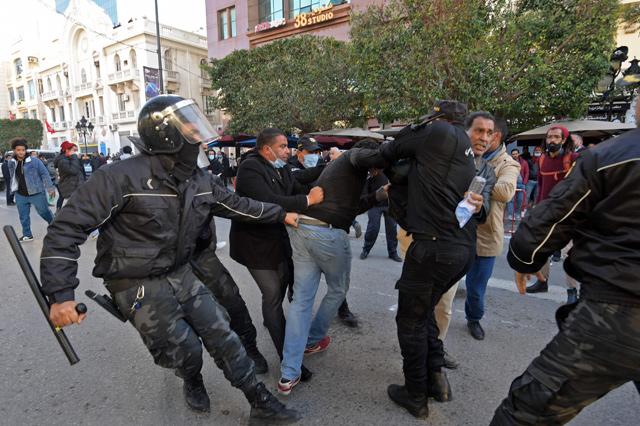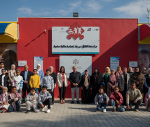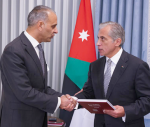You are here
Tunisia arrests over 600, deploys troops after riots
By AFP - Jan 18,2021 - Last updated at Jan 18,2021

Members of the Tunisian national guard sit atop their armoured vehicle as they deploy on a street amid clashes with demonstrators following a protest in the Ettadhamen neighbourhood in the capital Tunis, on Sunday (AFP photo)
TUNIS — Tunisian authorities said on Monday they had arrested more than 600 people and deployed troops after a third consecutive night of riots, mostly by young people in working class districts of several cities.
The unrest came despite a nationwide coronavirus pandemic lockdown declared last Thursday — the day that also marked 10 years since demonstrators forced dictator Zine Al Abidine Ben Ali's fall from power.
Interior ministry spokesman Khaled Hayouni said 632 people had been arrested, notably "groups of people between the ages of 15, 20 and 25 who burned tyres and bins to block the movement of security forces".
The social unrest comes at a time of economic crisis, worsened by the pandemic that has sparked rapid inflation and high youth unemployment and led many people to leave the North African country.
Some of those arrested had lobbed stones at police and clashed with security forces, leaving two policemen wounded, said Hayouni.
"This has nothing to do with protest movements that are guaranteed by the law and the constitution," he said. "Protests take place in broad daylight normally... without any criminal acts involved."
The army deployed reinforcements in several areas, said defence ministry spokesman Mohamed Zikri.
Amnesty International said the majority of those arrested were minors aged between 14 and 15, and urged authorities to refrain from using "excessive force" and to uphold the rights of those detained.
"Even when acts of vandalism and looting occur, law enforcement officers must only use force where absolutely necessary and proportionate," said Amnesty's Amna Guellali.
Social anger
Protests are currently banned in Tunisia due to the coronavirus pandemic and police had been deployed to impose a night-time curfew.
The clashes rocked several cities across Tunisia, mostly in working-class neighbourhoods, with the exact issues that sparked the disturbances often not immediately known.
But the tensions have exploded as many Tunisians are increasingly angered by poor public services and a political class that they charge has proven itself unable to deliver good governance a decade on from the 2011 revolution.
The economy shrank by 9 per cent last year, consumer prices have spiralled and one third of young people are unemployed.
The key tourism sector, already on its knees after a string of deadly extremist attacks in 2015, has been dealt a devastating blow by the pandemic.
On Monday, despite the protest ban, dozens again marched in the capital Tunis, chanting slogans denouncing "police and government corruption", police repression and the rise in poverty.
Police blocked the marchers as they reached the interior ministry.
Meanwhile messages were posted on social media calling for more protests on Tuesday in Tunis, the central city of Kairouan and Sfax in the east.
'No future here'
The army has deployed troops in Bizerte in the north, Sousse in the east and Kasserine and Siliana in central Tunisia, the defence ministry said.
Sousse, a Mediterranean coastal resort, is a magnet for foreign holidaymaking that has been hit hard by the pandemic.
Tunisia has registered more than 177,000 coronavirus infections, including over 5,600 deaths since the pandemic erupted last year.
The four-day lockdown ended on Sunday night, but it was not immediately known if further restrictions would be imposed.
The health crisis and ensuing economic misery have pushed growing numbers of Tunisians to seek to leave the country, with over 10,000 arriving in boats in Italy last year.
The mood was sombre in Ettadhamen, a restive Tunis working-class neighbourhood, on Sunday evening.
"I don't see any future here," said Abdelmoneim, a waiter, as the unrest unfolded around him.
He blamed the violence on Tunisia's post-revolution political class and said the rioting youths were "bored adolescents" angered by the politicians' "failure".
Abdelmoneim said he was determined to take a boat across the Mediterranean to Europe "as soon as possible and never come back to this miserable place".
Related Articles
TUNIS — Thousands of Tunisians marched in several cities protesting against the ruling party Sunday, criticising what they said was governme
TUNIS — Tunisia braced for further protests on Tuesday after hundreds were arrested in four nights of street clashes between riot police and
TUNIS — Tunisian security forces arrested dozens of young people during consecutive nights of disturbances in the capital and other cities,














